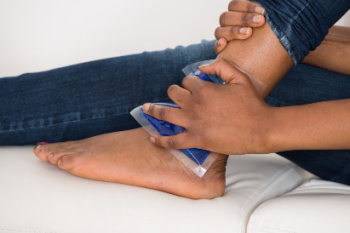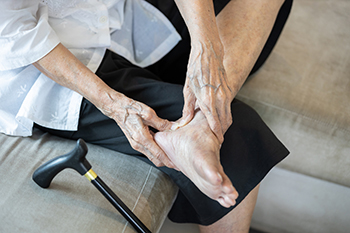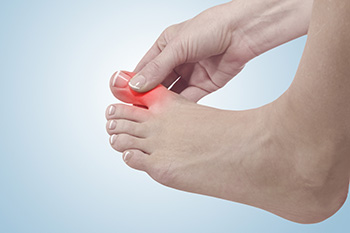
Ankle pain can result from a sudden injury, overuse, or an underlying condition like arthritis or tendonitis. Resting the ankle and avoiding activities that cause strain are important first steps. Elevating the foot can help reduce swelling and ease discomfort. Gentle movement and stretching, once the pain begins to subside, may support recovery, but pushing through pain can worsen the injury. Wearing stable, supportive shoes instead of sandals or heels can also help protect the joint. Avoid wrapping the ankle too tightly, which can cut off circulation. If the pain is sharp, persistent, or accompanied by swelling, bruising, or instability, it may indicate a fracture or torn ligament. Early evaluation can prevent long-term complications and improper healing. If your ankle pain does not improve or interferes with walking, it is suggested that you see a podiatrist for a proper diagnosis and appropriate treatment.
Ankle pain can be caused by a number of problems and may be potentially serious. If you have ankle pain, consult with Jim Maxka, DPM from South Penn Foot & Ankle Associates. Our doctor will assess your condition and provide you with quality foot and ankle treatment.
Ankle pain is any condition that causes pain in the ankle. Due to the fact that the ankle consists of tendons, muscles, bones, and ligaments, ankle pain can come from a number of different conditions.
Causes
The most common causes of ankle pain include:
- Types of arthritis (rheumatoid, osteoarthritis, and gout)
- Ankle sprains
- Broken ankles
- Achilles tendonitis
- Achilles tendon rupture
- Stress fractures
- Bursitis
- Tarsal tunnel syndrome
- Plantar fasciitis
Symptoms
Symptoms of ankle injury vary based upon the condition. Pain may include general pain and discomfort, swelling, aching, redness, bruising, burning or stabbing sensations, and/or loss of sensation.
Diagnosis
Due to the wide variety of potential causes of ankle pain, podiatrists will utilize a number of different methods to properly diagnose ankle pain. This can include asking for personal and family medical histories and of any recent injuries. Further diagnosis may include sensation tests, a physical examination, and potentially x-rays or other imaging tests.
Treatment
Just as the range of causes varies widely, so do treatments. Some more common treatments are rest, ice packs, keeping pressure off the foot, orthotics and braces, medication for inflammation and pain, and surgery.
If you have any questions, please feel free to contact our office located in Hanover, PA . We offer the newest diagnostic and treatment technologies for all your foot care needs.

As we age, regular foot exercises can help maintain strength, flexibility, and balance, which are key factors in preventing falls and staying active. Simple movements such as toe curls, ankle circles, and heel-to-toe walking can improve circulation and reduce stiffness. Stretching the calf muscles and the plantar fascia also helps relieve tension and support stability. These exercises can be done seated or standing, depending on comfort and ability. Consistency is more important than intensity, and even a few minutes a day can make a meaningful difference. Stronger, more flexible feet contribute to better posture and safer movement. Before starting a new routine, especially for those with arthritis, diabetes, or foot pain, it is helpful to get professional guidance. If you are a senior experiencing foot discomfort or are unsure which exercises are safe for you, it is suggested you see a podiatrist for a diagnosis, treatment, and individualized guidance.
Stretching the feet is a great way to prevent injuries. If you have any concerns with your feet consult with Jim Maxka, DPM from South Penn Foot & Ankle Associates. Our doctor will assess your condition and provide you with quality foot and ankle treatment.
Stretching the Feet
Being the backbone of the body, the feet carry your entire weight and can easily become overexerted, causing cramps and pain. As with any body part, stretching your feet can serve many benefits. From increasing flexibility to even providing some pain relief, be sure to give your feet a stretch from time to time. This is especially important for athletes or anyone performing aerobic exercises, but anyone experiencing foot pain or is on their feet constantly should also engage in this practice.
Great ways to stretch your feet:
- Crossing one leg over the others and carefully pull your toes back. Do 10-20 repetitions and repeat the process for each foot
- Face a wall with your arms out and hands flat against the wall. Step back with one foot and keep it flat on the floor while moving the other leg forward. Lean towards the wall until you feel a stretch. Hold for 30 seconds and perform 10 repetitions for each foot
- Be sure not to overextend or push your limbs too hard or you could risk pulling or straining your muscle
Individuals who tend to their feet by regular stretching every day should be able to minimize foot pain and prevent new problems from arising.
If you have any questions, please feel free to contact our office located in Hanover, PA . We offer the newest diagnostic and treatment technologies for all your foot care needs.

Big toe pain can be incredibly painful and disruptive, affecting your ability to walk or wear shoes comfortably. The pain can be caused by a number of factors, including injury, toenail problems, or gout. An injury to the big toe, such as a sprain or fracture, can cause throbbing pain, swelling, and difficulty moving the toe. Toenail issues, like ingrown toenails or fungal infections, can lead to sharp pain, redness, and tenderness around the nail. Gout, a type of arthritis, often targets the big toe, causing sudden, intense pain, swelling, and a feeling of heat, typically at night. Symptoms of big toe pain include sharp or throbbing pain, swelling, redness, or a decreased range of motion. A podiatrist can help by diagnosing the underlying cause of the toe pain through a physical exam and imaging tests. Treatment may include medication, proper footwear, toenail care, or even surgery for more severe cases. If you are dealing with big toe pain, it is suggested that you make an appointment with a podiatrist for a proper diagnosis and treatment.
Toe pain can disrupt your daily activities. If you have any concerns, contact Jim Maxka, DPM of South Penn Foot & Ankle Associates. Our doctor can provide the care you need to keep you pain-free and on your feet.
What Causes Toe Pain?
Most severe toe pain is caused due to a sports injury, trauma from dropping something heavy on the toe, or bumping into something rigid. Other problems can develop over time for various reasons.
Toe pain can be caused by one or more ailments. The most common include:
- Trauma
- Sports injury
- Wearing shoes that are too tight
- Arthritis
- Gout
- Corns and calluses
- Hammertoe
- Bunions
- Blisters
- Ingrown toenails
- Sprains
- Fractures (broken bones)
- Dislocations
When to See a Podiatrist
- Severe pain
- Persistent pain that lasts more than a week
- Signs of infection
- Continued swelling
- Pain that prevents walking
Diagnosis
In many cases the cause of toe pain is obvious, but in others, a podiatrist may want to use more advanced methods to determine the problem. These can range from simple visual inspections and sensation tests to X-rays and MRI scans. Prior medical history, family medical history, and any recent physical traumatic events will all be taken into consideration for a proper diagnosis.
Treatment
Treatments for toe pain and injuries vary and may include shoe inserts, padding, taping, medicines, injections, and in some cases, surgery. If you believe that you have broken a toe, please see a podiatrist as soon as possible.
If you have any questions please feel free to contact our office located in Hanover, PA . We offer the newest diagnostic tools and technology to treat your foot and ankle needs.

